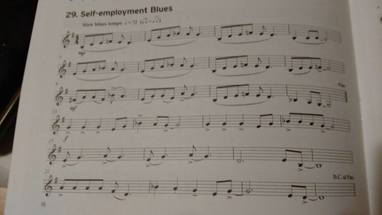 My current favourite clarinet study - don't believe the title! My current favourite clarinet study - don't believe the title! A phrase (or concept) that comes up in various forms when talking to and about adult learners is that "life gets in the way". Looking at discourses around family in the data for my MA research highlighted a recurring theme around family and work responsibilities restricting how much learners could play, practise or participate in musical activities. Almost half of the teachers I surveyed also mentioned that adult learners' other commitments had an impact on their learning - whether it was time to practise, having to cancel/ reschedule lessons, or just having the 'head space' to concentrate on learning. According to one study, the ideal teacher has “an understanding of the… responsibilities handled by adults, along with a steady insistence that students be challenged” (Roulston et al., 2015) This is definitely a challenge for teachers - judging how much to 'push' when there are other things going on in people's lives. It doesn't only apply to adult learners either. With children we're also balancing it up against other activities, school work, family circumstances, sometimes ongoing medical conditions. There's also working out how much of a priority music is for that individual person - the bigger a role it plays in their life, the more 'challenge' they're willing to take on to develop their skills. But the level of challenge can be both under- and over-estimated, and another of our jobs as teachers is to help students be realistic about that. Existing research highlights adult learners’ high levels of intrinsic motivation (Lamont, 2011, Taylor, 2011) - learning because they want to - but also finds that many struggle with 'unrealistic expectations' and subsequent frustration with their progress. We need to find ways of showing that it is possible to make progress as an adult, but it's not always going to be easy. And there isn't a set 'path' - some people spend weeks trying to get a reasonably clear sound on a flute; others quickly find a nice tone, but take longer to find the right hand position for them to balance the instrument well. Some people easily settle into a pattern of practising every day (one of my adult students works from home and has quick 'flute breaks' throughout the day), whilst others find it harder to fit another activity into their lives. (This has got me wondering about how music learners - both adults and children - manage increasing practice time and what impact that has on their progress, but I think I'll leave that for a future post). So part of the challenge is finding time, and again, how much of a priority music is has an impact on that. Now, I'm not being disparaging about those people for whom music isn't such a priority, or about different reasons for making it a priority - whether that's because they want to 'take it seriously', or because they really enjoy it, or because it's their 'me time' or their ten minutes of fun - I'm not going to judge the validity of anyone's reasons for playing music. My own journey of learning the clarinet - which has given me great insights into what it's like to be a beginner again - has brought up the issue of priorities for me too. I had set myself a challenge to do 100 sessions of clarinet practice in the last twenty weeks. It started well, I had a lovely chart where I coloured in boxes each time I practised, and for the first month or so I was on track. But then I got more students (always lovely - but slightly mystified by a sudden rush of enquiries in October!), I had some concerts to play in, I had the small matter of putting together a PhD proposal. The clarinet practice declined. And then I got a cold, and playing the clarinet with a cold is disgusting. I can cope with playing the flute with a cold, a cough, blocked ears - it's not fun but it's manageable (and I kind of have to sometimes, it's my job!). I don't have to play the clarinet though, so I didn't. I salute you reed players who manage to carry on when your head is all stuffed up. So I got out of the habit a bit. I've got back into it over the last few weeks, but there have been Christmas gigs and other festivities going on too. So I haven't done 100 practices - I can't actually tell you how many I have done as I have to admit I abandoned the chart (it was so colourful too!). The thing is, when I picked it up again, I realised I do enjoy playing the clarinet. It's a different sound, feeling and range to the flute - ahh, lovely low notes - and it's a different challenge as I'm still learning the basics and building up stamina (which I lost rather a lot of and am having to gradually get back). I'm enjoying finding out about the similarities and the differences to flute playing. But it isn't top priority - musically, the flute will always be that for me. And when life gets busy, the things that aren't top priority will drop off for a while. I don't always do as much flute practice as I'd really like - there are only so many hours in the day after teaching, admin, research, writing etc - so I have to prioritise what needs to be done, such as pieces for upcoming concerts (and sometimes that's very concentrated practice on the 'tricky bits' in short bursts). So I understand where students are coming from if I get to their lesson and they tell me they've not done much practice this week - I really do. But I will suggest ways of making practice more effective, and remind them that really, five minutes a day IS better than nothing, and five minutes a day is also better than an hour once a week. Life does get in the way, sometimes completely, and that's - well, that's life! But if you enjoy playing your instrument (even if the idea of practising is sometimes... urgh), then it's absolutely fine, in fact it's very good for you, to prioritise those bits of time doing something you enjoy. I need to remind myself of that sometimes too! -----------
Lamont, A. (2011). The beat goes on: music education, identity and lifelong learning. Music Education Research, 13(4), 369-388. Roulston, K., Jutras, P., & Kim, S.J. (2015). Adult perspectives of learning musical instruments. International Journal of Music Education, 33(3), 325-335. Taylor, A. (2011). Older amateur keyboard players learning for self-fulfilment. Psychology of Music, 39(3), 345-363.
0 Comments
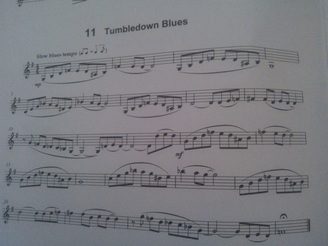 I said in my last post I'd be setting myself some new musical goals for the rest of the year, so here's the first one! I did my Grade 1 clarinet exam in July and straight afterwards I had a renewed burst of enthusiasm for playing it more. But I have to admit that initial burst faded a bit over the summer, and when I picked it up again the other week, it felt like really hard work! Like any skill, learning an instrument benefits from being practised little and often, far more than doing a big stint now and then. Last week I realised that the end of the year was twenty weeks away, or 140 days. Now, being realistic, I'm not going to practise the clarinet every single day (I don't expect my students to do that either - as with sports training, the odd 'rest day' is actually really beneficial) - some days I'm out of the house from 8.30am to 8.30pm! But five days out of every seven sounds pretty reasonable, and conveniently that makes a nice round 100 days between now (well, last week) and the end of the year. They might not always be long practices - I've just squeezed in ten minutes before writing this post - but that little and often approach is more likely to build up the right muscles gradually, whereas the occasional 'blow out' is more likely to just damage them - a bit like doing short jogs regularly, rather than just running a marathon once a month. Interestingly, my dissertation research found quite a few comparisons between music practice and sports training - I'll fill you in on them next time. In the meantime, I'm going to have another quick play through my current favourite clarinet study, James Rae's Tumbledown Blues, before heading out to teach... (practices so far = 2) 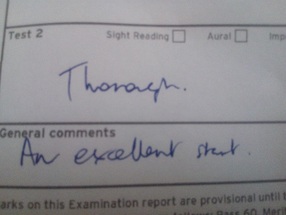 It's the start of the school summer holidays here, with lots of students and teachers taking a well-deserved break. I'm having a couple of weeks off from teaching but much of that time will be devoted to finishing my MA dissertation which is due in mid-August. I'm currently finishing writing up the section on how adult learners write about exams (well, I have been this morning - I'm currently having a short break, a cup of tea and a packet Hula Hoops, and writing this blog post!). My research has revealed some striking metaphorical language used about the experience of preparing for and taking exams. Perhaps not surprisingly, there's a lot of negative terms with groups of words which suggest violence - executed, hanging, murdering, killing - and pain - excruciating, suffering. The process of entering, preparing for, and taking exams is compared to a military campaign with terms such as withdraw, forearmed, territory, officer, bullet, target, medal - and there are also hints of a treacherous naval expedition - uncharted, adrift, wreck. But thankfully we also see the horizon and there is talk of surviving. There are also discourses which suggest that exam preparation is like training for a sport - hurdle, treadmill and discussion of tapering, and even what to eat on the day (which explains the initially mystifying appearance of potato in the corpus)! There are lots of terms which relate to movement - exams approach, near and loom. There is pushing and pulling, but also swinging and waltzing, and quite a bit of wobbling like a jelly. Adult learners express concerns about facing 'scary' examiners, but tend to find in reality that they are kind, gentle, courteous, calm, supportive, encouraging. 'Support' is a common theme, surfacing in descriptions of how teachers help learners prepare for exams and boost their confidence - my teacher is an angel, my teacher is lovely and encouraging. They also mention how helpful it is to have a friendly accompanist, if you play an instrument which is supported by a piano part. Online communities also offer support, with adult learners offering sympathy and hugs during the build-up and the wait for results, and many congratulations (for successful results, but also for being brave enough to take the exam in the first place!). A couple of months ago, I posted about my own plans to sit two Grade 1 exams, learning the clarinet more or less from scratch, and taking my piano playing right back to basics. I took both of these exams a couple of weeks ago. It was an incredibly useful experience as a teacher to be back in uncharted territory - although I've taken many flute exams, I'd never sat one on another instrument, so it did feel rather like being a beginner, not quite knowing what to expect or exactly how well I needed to play at this level. Nerves definitely kicked in, and I had no idea how my playing of each instrument would respond under pressure (whereas with the flute, I have a pretty good idea what happens and how to deal with it). It turns out that the fact my mouth dries up with nerves is even more 'bleurgh' with a reed in my mouth, but it is manageable! My experience of the examiners definitely agrees with those that the learners in my study talk about - both were friendly and welcoming. The one for my clarinet exam had no idea I had any musical background, so I felt I was being treated as she would any adult beginner, and it was a very positive experience, topped off by a lovely comment on my mark form declaring the exam "an excellent start" on my clarinet journey. What a boost that would be to any beginner! The piano exam was a slightly different experience, as I was sitting another exam (Flute Performance DipLCM) on the same day, with the same examiner! So she was aware that I had experience of music and exams behind me, and indeed joked that the supporting tests at Grade 1 should be fairly easy for me! ;) All the same, I still felt that I was judged on my performance as a Grade 1 piano student, rather than there being any 'extra' expectations of me (and I know that adult learners often feel they are expected to do 'better' to pass exams than children, simply because they are older). This was really helpful for me, as part of the whole point of sitting this one was to help build my confidence on the piano, to learn it properly rather than feel like I 'should' be at a certain standard with it due to the rest of my musical background. Still, I have to admit that getting full marks on the musical knowledge, aural and sightreading certainly did help with my overall score! It also underlined to me as a teacher how much impact these skills can have on how you get on in an exam (as well as being incredibly useful skills when making music, which is why they are tested in exams). For both instruments, I definitely agree with the learners in my study, when they say that having supportive teachers is a huge bonus in the exam process, helping you feel like you are on the right track and you can do this scary thing! I also agree with their thoughts about accompanists - it is incredibly comforting to work with someone you know is 'on your side' (something I found a bit daunting about the piano exam, as you're on your own there!). And yes, I did sit two exams on the same day. As well as the Grade 1s, I had entered myself for a flute performance diploma. I'm pleased to say I passed that too, and even more pleased to say it was an enjoyable experience. More about that in a future post, soon... but I must get back to the dissertation! 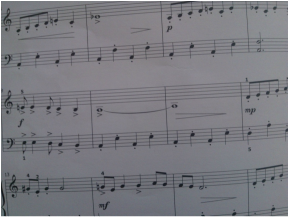 You might have heard of a Grade-One-athon before, or maybe not! Normally it involves an - often sponsored for charity - attempt to pick up an instrument you've never played before, enter and pass a Grade One exam within a term. I've known quite a few music teachers and other people who already play an instrument give it a go - sometimes it's been a quick challenge, and sometimes it's led to a love of an additional instrument that they've kept on playing long past Grade One. I'm not exactly doing that, as my challenges don't involve instruments that are 'brand new' to me. But this term I'm sitting two Grade Ones, and here's why... Piano - I don't remember exactly when and how I learned which notes were which on the piano. As a child interested in music I picked it up here and there I think, learned a bit from friends who had lessons. I had a keyboard from a really early age - at first one of those tiny Casio ones which the endlessly annoying 'demo' tune! When I started to take music more 'seriously' I had piano lessons, eventually auditioning on it as a second instrument for University. Although I did play a bit at Uni, for some reason that I can't remember either, we didn't get second instrument lessons in the end, so it fell by the wayside. That is, until my flute teaching started to increase, and I realised that I could play some of the simpler accompaniments to my student's pieces. And more than that, I actually really enjoyed playing them. I like being able to introduce students to playing with another instrument, and for those who do exams, it's lovely to be able to go along and accompany them for those first few early grades, to be a familiar face in an unfamiliar situation. The more I played the piano, the more I enjoyed it, and the more I wanted to improve, which led me to the idea of getting some lessons and maybe doing some exams. I had no real idea of what standard my piano playing was, but I really wanted to go back to basics, and gain more confidence with it. So this July, I'll be sitting Grade One piano. It's been fantastic to concentrate on some relatively simple pieces and get to grips with the detail of them, to start understanding different piano techniques and gradually start to feel like I can play music on it, rather than just learning notes. And to have help from a piano-teaching friend to guide me through all this, to point out the things I don't notice when I'm busy concentrating on everything else! 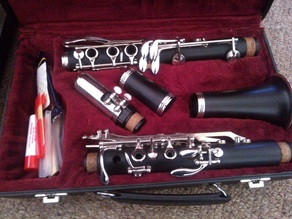 Clarinet - I played a clarinet once at school, when a good friend let me try hers. It was difficult to blow and I didn't like it anything like as much as playing the flute! I hadn't tried to play one again until a couple of years ago, when I picked one up cheap and tried to have a go at it. I made some sounds, but they weren't particularly pretty and I found it hard to remember which fingers to use (clarinet fingering is similar to the flute in places, and different in others). I felt like my face was filled up with air and my head was going to explode. So it sat in its case for a while. This year though, I decided to try again. I really thought about and analysed what was happening with my breathing, and how it was different from the flute which uses a lot more air. I had been doing a bit of recorder-playing and that helped with the fingering (eventually I moved from thinking "bottom octave = treble recorder" to it almost coming automatically). Again, I had some informal lessons with a friend who teaches clarinet, which was invaluable for details of technique that I wouldn't have picked up or known about myself, and spotting things like my stray little finger sticking out - something I never do on the flute, but put my fingers at a different angle and funny things happen! And I thought, why not, do an exam, see if you can properly learn some pieces and perform them in front of someone? So, yes, Grade One clarinet will also be happening this July. As well as expanding my playing skills onto different instruments, these little musical journeys have given me really valuable insights into being a beginner again. As a teacher, how I teach is influenced by how I was taught, by my experience as I teach different people, and by the reading I do and the training courses I go on. I also do a lot of thinking! But the experiences of picking up a (practically) new instrument and of re-starting an old one have helped me to remember what it's like to do something that feels really alien. To try to remember four different new physical skills at once. To try to translate the marks on the page to what your fingers etc are supposed to be doing - how that goes from being a process of 'working out' to one that's more 'automatic'. It's made me understand better what my adult students are feeling when they already have skills in other areas, even in other instruments, but they're trying to learn something new from scratch. But also to remember how good it feels to make progress with something that felt almost impossible to begin with. To confirm to myself, that indeed, you aren't too old to learn. And how exciting it is to be at the beginning of a journey, not knowing exactly where it will lead! (I also want to say thank you to the two people who've helped me out with lessons and advice, patiently listened to my squeaks and my randomly loud left-hand piano notes, answered my silly questions and entered me for the exams - thank you!) |
Keep in touch
I have an email newsletter where I share my latest blog posts, news from the flute and wider musical world, my current projects, and things I've found that I think are interesting and useful and would love to share with you. Expect lots about music and education, plus the occasional dip into research, language, freelance life, gardening and other nice things. Sign up below! Archives
July 2019
Categories
All
|
 RSS Feed
RSS Feed
